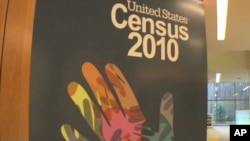America's founding fathers decided that a count of all the country's inhabitants should take place every 10 years. The 2010 census is now underway, and people all over the country are being asked to provide information about themselves. This year's census will show dramatic changes in America.
This part of Charlotte, North Carolina used to be known for pastoral countryside and old fashioned charm, but in the last decade it's changed. Charlotte has become a major financial center and expanded and immigrants came to work in the building boom here.
Latino community activist Angeles Ortega Moore drives through Charlotte's changed neighborhoods.
"At one point this used to be a middle income, to upper income community, here," explained community activist Angeles Ortega Moor. "It was very much an in place to be, and little by little it has sort of become, the demographic has changed, so it's a pretty popular area for Latinos and still a high proportion of African Americans."
Charlotte's Latino population has more than doubled, and other minority groups have also grown.
"Now you start seeing the Spanish language signs," added Moore. "This seems to be the Salvadoran corner, then you have a Middle Eastern, then a Mexican and a Vietnamese restaurant."
Ortega Moore says the immigrants were welcomed… at first.
"As the people began to change, there were needs from the community as far as education, services for the community," noted Moore. "That's when people started to notice it, and went, 'Ooh, ooh, wait a minute, what do you mean all of the sudden we have to put money?'"
She says she hopes the census will help to bring new resources to this area, because the census does not just draw new electoral districts for Congress. It's also used to distribute hundreds of billions of dollars for new roads, schools and hospitals.
The U.S. Census Bureau is headquartered just outside Washington. Management division chief Frank Vitrano has spent years planning this year's count.
"The census itself only has ten questions, but they're important questions: age, race, sex, Hispanic origin," said Vitrano. "These are data that are used to really help us understand what does our country look like, how are we aging, where are we geographically in the country?"
In order to do that, the Census Bureau has printed 130 million forms and mailed them out across America.
It's conducting a huge ad campaign. And it's sending people across America to explain the census.
Here in Charlotte not all people feel the changes of the past decade are for the better.
CHARLOTTE RESIDENT 1: "When I came, it was better than this. Too many people are coming in. People coming from everywhere."
CHARLOTTE RESIDENT 2: "Right now, if you weren't from Charlotte you couldn't find your way around. If you left for just five years, you couldn't find your way around no more."
Still census officials say it is important that everyone is counted.
William Frey, a demographer at the Brookings Institution in Washington, says most Americans do like getting information about who we are as a nation.
"There's just this intrinsic curiosity in the United States about this, and so the census is seen as this huge gold mine of statistics that people can use to get this information," said Frey.
And Charlotte is indicative of the transformation that has occurred in America's heartland over the last 10 years.
America has long been a melting pot of people from all over the world. But until now most of the melting, in the latest wave of immigration, occurred in big coastal cities, like New York, Los Angeles and Miami. The 2010 Census will let us know to what extent that has happened, in the rest of America.




